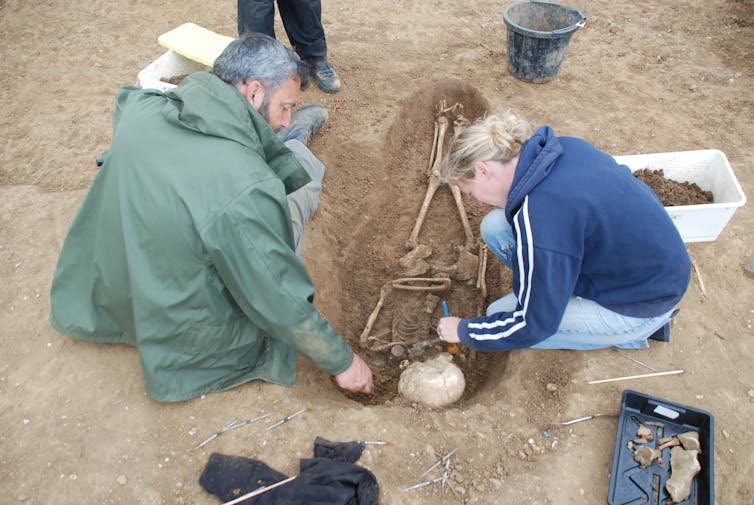The end of 2017 is barely a week away. So now is the perfect time to reflect on the positive difference humanity has made to the world over the past 12 months. How have we advanced as a species?

As Kevin Kelly from Wired wrote, “Ever since the Enlightenment and the invention of Science, we’ve managed to create a tiny bit more than we’ve destroyed each year… That few percent positive difference is compounded over decades into what we might call civilization… [Progress] is a self-cloaking action seen only in retrospect.”
My website, Human Progress, tracks technological, medical and scientific improvements that make the lives of ordinary people better. Here are the ones that have caught our attention in 2017, doubtless only a tiny fraction of all the advances humanity has made this year.
- February 6: The age of the bionic body – from robot hands, controlled by your mind, to electronic eyeballs, experts reveal 6 medical marvels introduced by new technology.
- February 6: Biologists help deaf mice hear again by inserting healthy genes into their ears – the work shows an ‘unprecedented recovery of inner ear function’ and could be used in humans.
- February 10: Computers turn medical sleuths and identify skin cancer – algorithm works as reliably as board-certified dermatologists, study shows.
- February 15: For the blind, an actual-reality headset – not just Star Trek fiction, a new visor from eSight is a lightweight, high-contrast vision system for legally blind people.
- February 17: Wyoming man receives ‘miracle’ face transplant 10 years after suicide attempt.
- February 18: Smartphones to become pocket doctors after scientists discover camera flash and microphone can be used to diagnose illness.
- February 20: Hope for millions as scientists discover multiple sclerosis treatment that can slow its progression.
- February 22: Life expectancy to break 90 barrier by 2030.
- March 2: Teenager’s sickle cell reversed with world-first therapy.
- March 3: Terminal cancer patients go into complete remission after groundbreaking gene therapy.
- March 3: UTA professor invents breath monitor to detect flu.
- March 6: Google’s artificial intelligence can diagnose cancer faster than human doctors – the system is able to scan samples to determine whether or not tissues are cancerous.
- March 8: The robot will see you now! Chat-bots that monitor symptoms will become more accurate and quicker at spotting illness than doctors.
- March 8: Scientists discover new state of matter called ‘Time Crystals’ – time crystals seemingly break the rules of normal time-keeping and potentially pave the way for quantum computers and quantum sensors.
- March 10: Scientists make progress toward engineering synthetic yeast – the work brings to six the number of yeast chromosomes that now can be synthesized, according to new research.
- March 13: More people could benefit from BRCA breast cancer drugs.
- March 14: Swedish men on target to be first to completely stub out smoking.
- March 15: Startup serves up chicken produced from cells in lab – ‘clean meat’ developers say it avoids towering costs of feeding, caring for livestock.
- March 15: The next innovation in shipping – Wind Power; Maersk launches trial run of tanker using rotating cylinders that can function as high-tech sails.
- March 18: An insect’s eye inspires a new camera for smartphones – a series of eyelets can make cameras much smaller.
- March 23: New rotavirus vaccine could prevent thousands of childhood deaths.
- March 24: Machines which detect cancer symptoms could be out in a year.
- March 27: Can tech speed up emergency room care? A New York hospital system tests a new way to use telemedicine, where E.R. doctors examine patients without being in the same room.
- April 2: Plastic-eating fungus may solve garbage problem.
- April 6: To handle electronic waste, freeze it and pulverize it – scientists say a new technique can make it more profitable to harvest metals and other materials from circuit boards in old TVs, computers and more.
- April 26: Artificial ‘brain in a dish’ is created in a world first: Breakthrough could shed light on conditions such as Alzheimer’s.
- May 2: CRISPR eliminates HIV in live animals.
- May 4: Scientists engineer baker’s yeast to produce penicillin molecules.
- May 5: Iceland drills 4.7 km down into volcano to tap clean energy.
- May 11: Scientists have created an exoskeleton to stop elderly people from falling.
- May 11: HIV life expectancy ‘near normal’ thanks to new drugs.
- May 17: Lab-grown blood stem cells produced at last – two research teams cook up recipe to make long-sought cells in mice and people.
- May 18: Antibodies from a human survivor define sites of vulnerability for broad protection against ebola viruses.
- May 18: Scientists look to skies to improve tsunami detection.
- May 22: World’s largest aircraft completes successful test flight.
- May 23: MIT researchers develop a moisture-responsive workout suit with live cells.
- June 1: ‘Instantly rechargeable’ battery could change the future of electric and hybrid automobiles.
- June 1: Extinct species of Galapagos giant tortoise may be resurrected.
- June 3: SpaceX successfully launches reused Dragon spacecraft for ISS resupply.
- June 3: ‘Liquid Biopsy’ passes early test in quest to find cancer in blood .
- June 13: Live antibiotics use bacteria to kill bacteria.
- July 3: This Silicon Valley company wants to ‘make better humans’ through biohacking.
- July 6: DNA from sharks that can live up to 400 years could hold the secret to a longer life.
- July 6: Robot wars – knee surgery marks new battleground for companies.
- July 9: Banks deploy AI to cut off terrorists’ funding.
- July 11: Scientists design a solar cell that captures nearly all energy of solar spectrum.
- July 17: Bananas – scientists create vitamin A-rich fruit that could save hundreds of thousands of children’s lives.
- July 22: This new material could let phones and electric cars charge in seconds.
- July 26: New artificial spider silk: stronger than steel and 98 percent water.
- July 28: Melanoma: – new, more effective drug steps closer.
- July 28: Could stem cells reverse the aging process)?
- July 28: Juvenescence AI to develop first compounds generated by Insilico’s deep-learned drug discovery engines.
- August 4: IBM storage breakthrough paves way for 330TB tape cartridges.
- August 28: Anti-inflammatory drug ‘cuts heart attack risk’.
- August 30: Trial raises Parkinson’s therapy hope.
- August 30: FDA clears first gene-altering therapy — ‘a living drug’ — for childhood leukemia.
- September 7: Shropshire farm completes harvest with nothing but robots; a world-first in automation.
- September 12: U.S. middle-class incomes reached highest-ever level in 2016, Census Bureau says.
- September 23: Newly engineered antibody could kill off 99 per cent of HIV strains.
- September 28: DNA surgery on embryos removes disease.
- October 9: Google is going to use experimental high-altitude balloons to provide internet in Puerto Rico.
- October 18: Dyslexia link to eye spots confusing brain, say scientists.
- October 29: Saudi Arabia to allow women into sports stadiums.
- November 13: Brain implant boosts human memory by mimicking how we learn.
- November 14: ‘Better than Concorde’ supersonic 1,687mph airliner to ‘revolutionize’ air travel by 2025 (link).
- November 15: The firm that can 3D print human body parts.
- November 15: US scientists try 1st gene editing in the body.
- November 15: US biotech unicorn steps up competition for BioNTech’s mRNA personalized cancer vaccine.
- November 24: Cancer breakthrough: Potential cure could be ready as early as next year.
- November 26: Diabetes drug ‘could be used to end agony of transplant rejection’.
- November 29: Expanding DNA’s alphabet lets cells produce novel proteins.
- November 30: Designer proteins—the new generation of HIV vaccines being put to the test
- November 30: Trees are covering more of the land in rich countries – the spread of forests is not always popular. But it is sure to continue.
- December 1: HIV breakthrough as cancer drug could hold secret to curing the virus.
- December 1: In Rwanda, drones deliver medical supplies to remote areas – such services help people in isolated regions – and could yield lessons for making shipments elsewhere.
- December 4: China rules aquaculture as fish output triples in decade.
- December 7: Bumper crops boost global cereal supplies in 2017/18.
- December 10: Democracy is far from dead – in 12 years, the share of the world’s people who live in ‘free’ countries has risen.
- December 11: Huntington’s breakthrough may stop disease.
- December 11: Tasmanian tigers aren’t extinct (or at least they won’t be for long!) – Scientists unlock mysterious creature’s DNA – and plan to clone it bring the beast back to Australia.
- December 13: Streetlights could be replaced by glowing trees, after scientists make plants shine in the dark.
- December 14: Haemophilia A trial results ‘mind-blowing’.

Marian L. Tupy is the editor of HumanProgress.org and a senior policy analyst at the Center for Global Liberty and Prosperity.
This article was originally published on FEE.org. Read the original article.






